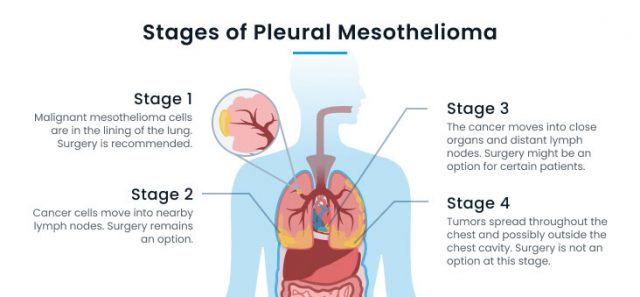Stage 4 mesothelioma cancer is the most advanced stage and is terminal. Cancer has spread to distant organs and parts of the body in this stage. You may have difficulty breathing, chest pain and fatigue. Treatment options are palliative to manage and ease symptoms until the end of life.
What Is Stage 4 Mesothelioma?
Stage 4 mesothelioma is the most advanced and final stage of asbestos cancer. Extensive tumor spread makes it very difficult to treat. For many patients and loved ones, this can be an emotionally and physically difficult time. You may feel anxious, depressed and hopeless in the final stage of mesothelioma. Palliative care and therapy can provide comfort, which is often the goal with stage 4 mesothelioma.
The staging method is different for all four types of mesothelioma. These details generally refer to an “end-stage” diagnosis. In stage 4, tumors have invaded deeper tissue and spread to distant sites. This metastasis means the cancer is likely present in remote lymph nodes and organs.
- Stage 4 Pleural Mesothelioma. Stage 4 mesothelioma that affects the lungs is the most common type. Epithelial or sarcomatoid cell tumors spread to the liver or kidneys. Symptoms include breathing difficulty, painful coughing, chest pain and weight loss.
- Stage 4 Peritoneal Mesothelioma. There is no official stage 4 for peritoneal mesothelioma. This type occurs in the abdomen and accounts for roughly 20% of all cases. End-stage extensive tumor spreading may involve the liver. Surgery usually is not an option.
- Stage 4 Pericardial Mesothelioma. This variant affects about 1% of patients. It develops on the pericardium, the heart’s protective lining. Cancer may spread to the esophagus. Doctors use general staging guidelines for pericardial mesothelioma.
- Stage 4 Testicular Mesothelioma. Testicular mesothelioma is the rarest type and affects less than 1% of patients. There is no official staging system and no formal stage 4. Doctors diagnose this type as an advanced disease. It can spread to distant pelvic tissue.
Stage 4 is the most severe stage of this type of cancer. For some patients there may be an opportunity to participate in a clinical trial that could provide researchers much-needed insight on how to better treat mesothelioma in these last stages.
Memorial Sloan Kettering Cancer Center, in conjunction with SELLAS Life Sciences Group, is working on a study combining immunotherapy with a targeted cancer vaccine for late-stage pleural mesothelioma patients.
“We’ve seen some very, very positive results,” Dr. Dragan Cicic, director of clinical development at SELLAS, told The Mesothelioma Center at Asbestos.com. “Patients in advanced stages can still go forward with a solid quality of life. This is very promising.”
Symptoms of Stage 4 Mesothelioma
Stage 4 mesothelioma symptoms include pain, fatigue, fever and more. Distant spread occurs in this late stage. Some patients have no symptoms. Some symptoms are vague and mimic common symptoms of mesothelioma and other cancers. If symptoms occur, they are typically severe and appear where the cancer has spread, such as the liver, kidneys and spleen.
Brain metastasis causes some of the most frightening symptoms. You may lose control of your emotions, memory or muscle function. Remember to utilize all your support resources, including your loved ones. Your medical team will also work to help you regain control.
Symptoms of end-stage mesothelioma may include:
- Abdominal pain
- Anemia (low red blood cells)
- Cachexia (muscle breakdown)
- Coughing up blood (hemoptysis)
- Difficulty swallowing (dysphagia)
- Fatigue and poor well-being
- Fluid buildup in the chest or abdomen
- General feeling of discomfort (malaise)
- Night sweats and fever
- Pain and tightness in the chest
- Severe weight loss or anorexia (lack of appetite)
- Shortness of breath (dyspnea)
- Thrombocytopenia (low platelet count)
You may feel generally unwell and need help moving around. Some changes affect your hormone levels and may leave you with low energy or feeling depressed. These are not typical emotions. Always seek mental health resources when needed.
Living with this cancer can be challenging. It doesn’t always cause noticeable symptoms. Inform your doctor of any new or changing signs in your health. Not knowing what to expect can be frightening, but you’re not alone.
How Long Do You Live With Stage 4 Mesothelioma?
The median survival rate for stage 4 mesothelioma is about 12 months with treatment. For pleural patients, life expectancy is about 14.9 months. Coming to terms with a stage 4 diagnosis is challenging. It can be overwhelming and emotional for you and your loved ones.
Stage, health and tumor growth are vital factors. At stage 4 pleural cancer, respiratory failure is likely. Heart failure is a possibility if the tumors spread to the heart. If a patient responds well to treatment, it may extend survival and improve prognosis.
Patients with good prognostic factors may live longer than average. Epithelial cell type is one example that correlates with better prognosis and survival. Other factors include health, younger age, female gender and no signs of blood disorders.
Stage 4 Survival Rate Statistics
Over 7% of stage 4 pleural mesothelioma patients live five years or more. Peritoneal patients have a better prognosis. Neary 30% survive for at least five years with treatment. Patients diagnosed in stage 4 who decide against treatment live an average of six months.
No two cases of mesothelioma are the same. Survival statistics cannot predict how long someone with mesothelioma will live.
Some patients tend to respond better to treatment. A 2021 research study found that stage 4 survival was 7.9 months for patients who responded well. The median survival was 2.4 months for its chemoresistant group.
How Is Stage 4 Mesothelioma Treated?
Mesothelioma treatment options are palliative at stage 4. This type of cancer has no cure, but chemotherapy is often the best option. Chemo and radiation can shrink tumors to reduce pain and pressure. Dealing with symptoms in stage 4 is not easy. The proper treatment can help you cope.
When you choose a treatment, it’s crucial to consider likely side effects. Chemotherapy can lead to nausea. Radiation irritates the skin. Talk to your doctor about advanced options. You may be a candidate for immunotherapy or surgery.
Palliative Treatment
Palliative or supportive care focuses on easing pain and other symptoms. It is the most common option for stage 4 patients. It may include pain medication, oxygen therapy and respiratory therapy. Patients who receive early palliative care have an almost 400% increase in survival time.
Chemotherapy and Immunotherapy
Chemotherapy is a routine therapy for stage 4 mesothelioma. The typical course is a platinum drug with pemetrexed (Alimta). Chemo can double the life expectancy of some stage 4 patients. Side effects often include nausea, vomiting, fatigue and anemia.
Surgery
Surgery involves removing as much tumor mass as possible. This is a process known as debulking. Some stage 4 pleural mesothelioma patients qualify for tumor-removing surgeries. Recovery may take several weeks, but palliative options can extend survival by months. Chemo can also reduce tumor size and make surgery more effective.
Radiation and Targeted Therapies
Radiation therapy is a targeted treatment option for stage 4 mesothelioma. The therapy can lessen chest pressure, decrease pain and improve breathing. Side effects tend to include fatigue and skin irritation. Proton therapy, a newer type of radiation, can boost survival to over 30 months for stage 4 patients.
Alternative and Complementary Medicine
Stage 4 mesothelioma patients may choose to use complementary or alternative therapies. Options such as acupuncture or massage may reduce symptoms. Talk to your doctor first. These treatments do not offer a cure or substitute for standard care. The best options for wellness are often exercise and nutrition. A cancer nutritionist can guide you toward a healthy cancer diet.
Managing a Stage 4 Mesothelioma Diagnosis
Coping with stage 4 mesothelioma can be overwhelming. You don’t need to overcome the physical and emotional challenges alone. Support resources and assistance can also ease your burden as a caregiver.
Steps To Consider After a Stage 4 Diagnosis
- Take time to learn about resources for your family.
- Improve your emotional well-being through mental health counseling.
- Share your experiences and learn strategies through a mesothelioma support group.
Your life is not over after a mesothelioma diagnosis. Support resources help patients live years beyond their predicted life expectancy. With help, you can build a support network for yourself and your loved ones.
“It is important to provide these patients the best supportive care, make them comfortable and have dignity,” said Dr. Jacques Fontaine, director of the Mesothelioma Research and Treatment Center at Moffitt Cancer Center in Tampa, Florida.
End-of-Life Planning
End-of-life planning may include palliative care, pain management and many other options. These choices are essential for stage 4 patients. Knowing your family will honor your end-of-life care plan may help lessen your anxiety.
Document your decisions in clear, concise language. Find a trusted lawyer to draft binding documents. Ask your medical team for a blank copy of all documents they recommend. These can help you plan for end-of-life medical care.
Considerations for End-of-life Decision Making
- Choose where you want to receive care. Tell your medical team your priorities for symptom and pain management. Decide where you want to receive care. You may prefer a hospice program over a hospital. You can also choose a caregiver and arrange for in-home medical services.
- Organize your financial affairs and personal records. Give your Social Security number, passwords and contacts to a trusted family member. Specify the beneficiaries in your will for insurance policies, bank accounts and possessions. Do the same for employer or union benefits, lawsuits and tax returns. You may also have investments such as an IRA or 401(k).
- Consider care for your family and funeral arrangements. Name someone to care for children or pets. Provide detailed information on how you want your body handled. Describe in writing the type of memorial or funeral service you’d like.
A stage 4 mesothelioma diagnosis can be devastating. It doesn’t mean you can’t control some aspects of your cancer. Taking a proactive approach can reduce stress and worry. It can also clarify for family and friends how you wish to manage your end-of-life care.
 Lifeyet News Lifeyet News
Lifeyet News Lifeyet News





